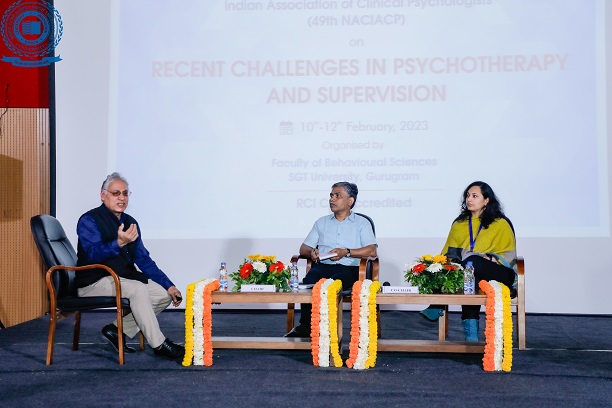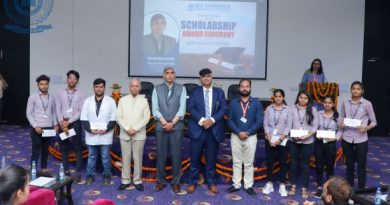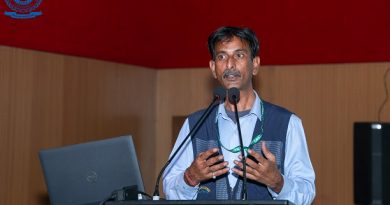Day 3 of The 49th National Annual Conference of Indian Association of Clinical Psychologists 2023.
Day 3 of The 49th National Annual Conference of the Indian Association of Clinical Psychologists 2023 witnessed a massive turnout of the audience as the enthusiasm of the delegates surpassed the occasion of the weekend. The conference started with the scientific session themed, “Neuroanatomical Basis of Behavioural Psychotherapies in Substance Use Disorders”. The session was chaired by Dr. M. Thomas Kishore and Co-chaired by Dr. Jhanvi Devdutta. The invited speaker was Prof. V. P. Mahla
HOD, Department of Psychiatry. The session was replete with insightful takeaways for the audience as Dr. Mahla elaborated upon the genesis, duration, outcome, and possible measures to reduce the impact of Substance use disorder. The session delved deeper into the interplay between the biological and behavioral aspects of using substances.
The scientific session was proceeded by various symposiums, that witnessed ample participation of faculty members from the department of Behavioural Science. The first symposium was organized under them: Problematic Internet Use : Risk factors, Management, and Challenges. The symposium was chaired by Dr. Venugopal, Clinical Psychologist, JIPMER, Pondicherry and co-chaired by Dr. K. Vijayan, a clinical psychologist who hails from the eminent CSI Medical College, Karakonam, Trivandrum. The speakers’ panel included Dr. Anita Manglani, Ms. Megha Sharma, Dr. Navkiran Khalsi – assistant professors, Clinical Psychology, SGTU, and
Ms. Lini Philip, clinical psychologist at the All-India Institute of Medical Science. The symposium threw light upon the definition of the intensity of the problems associated with excessive surfing of the rabbit-hole of the World Wide Web. References were made to the internet as the “ electronic opium” to indicate how the Asian culture has internet-social culture painted gold and made money out of it. Multiple reports were cited to make direct references to the internet- usage behaviour shown by people across demographies. The doubt session had to be cut short due the crunch of time yet the intellectual cravings of the audience were satisfied to a large extent.
The next symposium was conducted under the theme : Supervision in Psychotherapy in General and Online/Tele Psychotherapy in specific. The speakers for the session were Dr. Priyanka Lenka, Assistant Professor, Department of Clinical Psychology, CIP,
and Dr. Ankita Raipure, MPhil Trainee, CIP. The session was chaired by Dr. Manoj Kumar Bajaj, and
Co-chaired by Dr. Lalit Kumar. The symposium drew attention of the audience to an essential element of psychotherapy, that is professional supervision. It was recognised that there are various factors which make professional supervision difficult in general and in online/tele psychotherapy and these factors were addressed at great length leading to insightful discussions and creating a roadmap for the future.
The next symposium was organised under the theme : Life Skill Training for Geriatric Mental Health: An Orientation. The symposium was chaired by Prof. Dweep Chand Singh and co-chaired by Dr. Mustafa Nadeem Kirmani. The speakers for the symposium were Dr. Rakesh Kumar Tripathi, Professor, Junior Grade, Department of Geriatric Mental Health, King George’s Medical University and Dr. Niasha Mani Pandey, Department of Geriatric Mental Health
King George’s Medical University.
The session laid an emphasis on the importance of learning life skills and adapting to healthy lifestyle activities to deal with enormous situations in life. The session drew the audience’s attention towards the various mental health problems the greying population may be suffering with, and asserted how life training can be effective.
The symposiums were followed by a host of “paper presentation sessions”, which allowed various clinicians and researches to present their academic papers before an esteemed panel of stalwarts from the field of Psychology. These sessions were held simultaneously, in various allocated venues. Over 50 participants displayed the rigour of their research paper through a vivid description of powerpoint presentations. Numbers, theories, graphs, facts, and data points were organised in a manner that created a lasting impact on the minds of the panelists. A myriad of topics were covered.
The first parallel session revolved around the theme: Development in psychotherapy and counselling. The session was chaired by Dr. Mohammad Akmal shah and co-chaired by Dr Imlisongla Longkumer. The session witnessed the presentation of multiple papers highlighting the relationships between “ Well-being, quality of sleep, stress levels’ emotional states, intrusive thoughts”. All these variables were discussed in the backdrop of therapy, showing the evolution of the field.
There were multiple parallel sessions revolving around the theme : psychosocial correlates of mental health. Since the theme provided a wide scope to the presenters to showcase their work, over 20 presenters delved into the nitty-gritty of the topic. The chairpersons for these sessions were Dr Surender Kumar, Dr. Pooja Mahour,
Correlation between various behaviours and the correspond mental states were drawn to justify the nature of the session.
The next parallel session revolved around the theme : Child and adolescent mental health. The session was presided over by 2 prominent faces in the field of Psychology- Dr. Ajaz Ahmad Kahn and Dr. Amandeep. The session covered aspects of parenting style, emotional regulation in children, disorders during the phase of adolescence, and juvenile offending as a maladaptive behaviour.
The next parallel session revolved the theme : Challenges in tele counseling and further developments in psycho therapy. Dr. Smriti Joshi was the chairperson and Dr. Anand was the co-chairperson. The session covered an array of topics ranging from the advantages and limitations of the digital revolution on the mental health of youth, barriers in tele-counselling, and online tele consultation uses by older adults during the COVID Pandemic.




